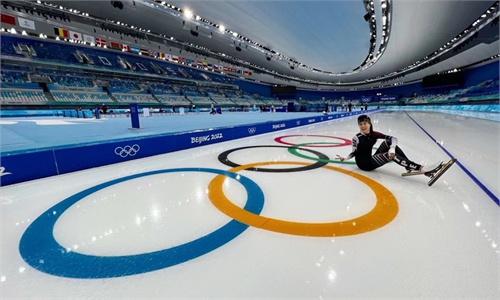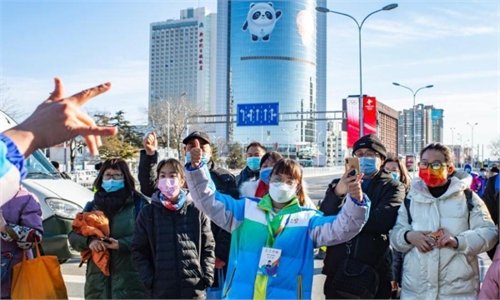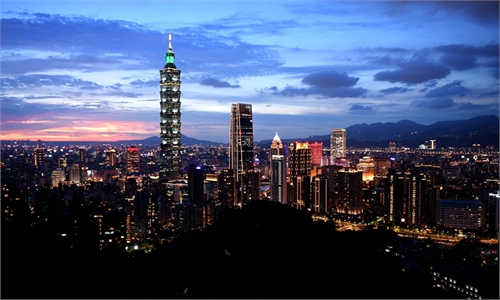GT Investigates: A ‘green terror’: Separatist DPP authority tries to silence pro-reunification and mainland-friendly Taiwan citizens with punishment, threats
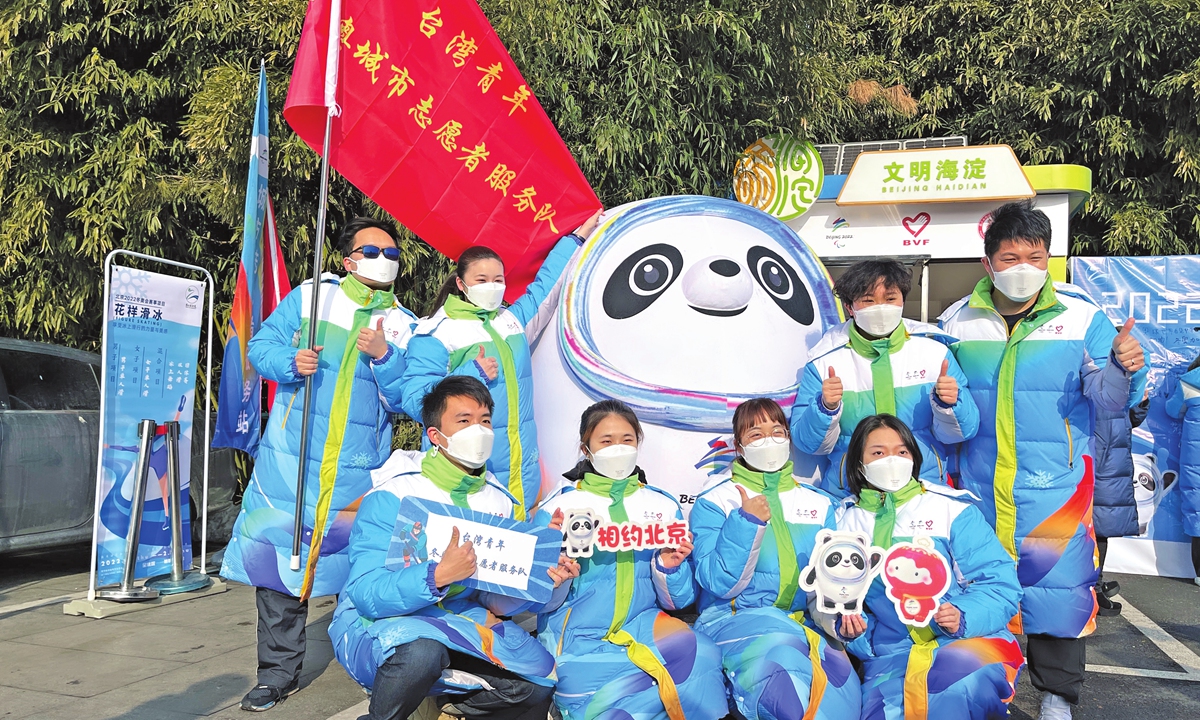
Taiwan volunteers for Beijing 2022 Winter Olympic Games take a group photo in Zizhuyuan Park, Beijing on February 5, 2022. Photo: VCG
The ongoing 2022 Winter Olympic Games and the just concluded Chinese Spring Festival holidays, this year's biggest sports pageant and the most important festival for Chinese people on both sides of the Taiwan Straits, have predictably become a tool for the pro-secessionist Taiwan Democratic Progressive Party (DPP) authority to reignite the "independence" farce and obstruct cross-Straits exchanges.On the eve of the Beijing Games opening ceremony on February 4, speed skater Huang Yu-ting from the island of Taiwan faced wide condemnation by separatist local media outlets for wearing an outfit with the word "China" emblazoned on the back. Huang's social media accounts were soon flooded with negative comments and hate speech.
Earlier, several Taiwan entertainers who attended this year's China Media Group (CMG) Chinese Lunar New Year Gala on January 31, including singer Jam Hsiao and actress Ouyang Nana, became victims of targeted abuse and threats from Taiwan's DPP-backed politicians, scholars, and media forces for "being friendly to the mainland," in line with the viciousness continually demonstrated by the separatists on the island, the public found.
By constantly threatening and intimidating pro-reunification and mainland-friendly entertainers, businessmen, and even ordinary people in Taiwan, the "green terror" the Tsai Ing-wen's DPP authority creates has become a menacing fantom in the mind of Taiwan public, criticized observers on Taiwan issues.
"That is venomous poison," Li Zhenguang, professor and deputy director at the Institute of Taiwan Studies under the Beijing Union University, told the Global Times. "In order to sever ties with the mainland, the Tsai authority hangs the sword of Damocles over every Taiwan citizen."
Wielding the claws of intimidation
The active participation of Taiwan entertainers at the 2022 Chinese Lunar New Year gala caused the DPP to further expose itself by directing more targeted attacks, observers noted.
Jam Hsiao, For example, who performed at the gala for the third time this year, was criticized by Taiwan "legislator" Tsai Shih-Ying for "using Taiwan for his own money-making purposes" when Hsiao said in an interview that "Taiwan people must go home and look in."
At the gala, Hsiao sang the well-known ballad Yellow River, Yangtze River with singers from the mainland, Hong Kong and Macao special administrative regions, he also said that these two rivers are like blood that nourishes the Chinese people.
However, Tsai slammed Hsiao for being born in Taiwan, claiming that the Taiwan people will never allow him to "consume" Taiwan, Taiwan local media United Daily News reported.
"By contrast, the people of Taiwan don't mind Hsiao's words at all, and his fans still support him," Taipei resident Kristin Mao told the Global Times.
Mao said her relatives also followed the performance, and think these unnecessary attacks by politicians and media personalities manipulated by the DPP are old hat .
"The song and Hsiao's statement even reminded my grandfather and parents' generation of Kris Phillips' Clouds of Hometown sung at the gala in 1987, they were really eager to go home for a visit," Mao said.
Mao pointed out that in recent years, the DPP has continued to extend the clutches of "green terror," that often uses political intimidation against Taiwan entertainers who participate in cultural and artistic activities on the mainland, with threats of cancelation by authorities of their Taiwan household registration, the seizure of health insurance cards, and not being allowed to return to the island.
At the CMG National Day Gala in October 2021, Ouyang sang My Motherland. In response, the cultural authority of Taiwan assigned relevant departments to collect evidence to verify the "illegalities" in an attempt to deal with her "according to the law."
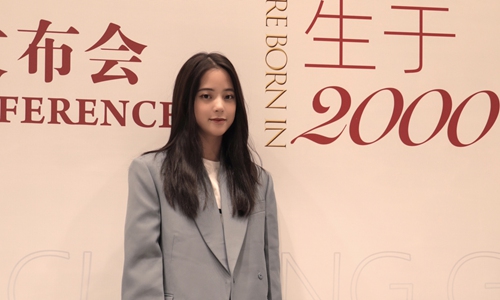
Ouyang Nana attends a press conference for the Beijing Music Festival's We Were Born in 2000 concert. The concert will close out the 10-day festival on Tuesday. Photo: Courtesy of BMF
In addition to Ouyang, the DPP also threatened to take "legal action" against Taiwan actress Fang Fang, simply for her vocal support of reunification with the Chinese mainland.
DPP authority slandered and threatened normal exchanges between people on both sides of the Straits, the mainland officials responded on January 26. It fully shows the DDP's increasingly feeble and fearful attempts at blocking the reunification of people on both sides of the Straits, they criticized.
In March 2021, after H&M, Nike, Adidas, and other Western fashion brands announced a boycott of Xinjiang products,several Taiwan entertainers terminated their cooperation with the brands. However, the head of Taiwan's executive body, Su Tseng-chang, ridiculed these entertainers in response, saying that they did not know the importance of "human rights" for the sake of their own interests.
"The DPP is unable to completely sever Taiwan people's ties to the mainland, so it sets up obstacles through unorthodox political tactics and public opinion attacks, which is disgraceful, manipulative, and delusional," Mao said.
Taiwan media outlets found that there were 28 Taiwan-born entertainers who wished a "Happy birthday to the motherland" on social media during the People's Republic of China's National Day in 2021, while they were completely silent during the so-called Taiwan National Day on October 10.
'Green terror' spreads
In Taiwan, the pro-secessionist DPP and its supporters are described as the "green" camp, while the Chinese Kuomintang (KMT) party and its supporters are called the "blue" camp. Since the DPP came to power in 2016, people from all walks of life in Taiwan have suffered under its "green terror," the public found.
Apart from defamation and a campaign of threats against mainland-friendly entertainers, the DPP authority also directly monitors, punishes, or arrests those who support reunification and are close to the mainland, said observers from both sides of the Straits. "Take a look at how they have treated some pro-reunification politicians on the island," Li exampled. "Home of Chang An-lo, founder of Chinese Unification Promotion Party was searched, and Yok Mu-ming, former chairperson of the New Party, was threatened with jail time."
In January, a local court in Taipei sentenced five Taiwan individuals to between 20 and 46 months in prison for voting for Han Kuo-yu, a candidate of Taiwan's then regional leadership election in 2020, with "money from the [Beijing] government." Lin Huai, chairman of a Taiwan business association in Changsha, Central China's Hunan Province, received a 46-month prison term and "has been deprived of his civic right for four years," Taiwan media reported on January 17.
Beijing has never been involved in Taiwan's elections, the Taiwan Affairs Office of the State Council stated. It condemned the DPP authority for implicating Taiwan compatriots' crimes.
"The DPP authority is used to fabricating various kinds of excuses to crack down on Taiwan organizations and individuals participating in cross-Straits exchanges and cooperation," responded the office spokesperson Zhu Fenglian on January 18. "It makes 'green terror,' and instigates hostility and confrontation across the Taiwan Straits through political manipulation, which undermines cross-Straits relations and harms the interests of the people of Taiwan."
The students and teachers who want to study or teach in the mainland fail to survive the "green terror" as well.
After some high school graduates in Taiwan applied to mainland universities in 2018, they or their schools were reportedly interrogated or investigated by local government agencies. Lin Chin-po, then principal of the Taoyuan Municipal Wu-Ling Senior High School, said that when the number of students at his school who applied to mainland universities surged that year, investigation bureau officials visited him, reported Taiwan-based China Times in May 2018.
The officials asked Lin to explain the surge, and to make clear whether or not Lin's school had "encouraged students to study in the mainland," according to the China Times. The incident caused widespread anger among the Taiwan public, as many netizens lambasted Tsai's unfettered "green terror" and the victimization of young, innocent students.
These are planned attacks by the DPP authority against the mainland-friendly Taiwan citizens, Li commented. "By repressing a few in various industries, it wants to cause a chilling effect to scare those eager to visit the mainland."
Nonetheless, experts believe that in the long term, the separatists' underhanded tactics won't stop people on both sides of the Straits from connecting, as the two sides are economically highly interdependent. In 2021, mainland-Taiwan trade grew 26 percent year-on-year to $328.34 billion - double that of $160.03 billion in 2011, official data from the General Administration of Customs showed. Taiwan's trade surplus with the mainland hit a record high of $104.74 billion.
"With a strong basis of economic exchanges, we are looking forward to seeing more people on both sides make efforts to break through the barriers and get closer to each other, especially after the COVID-19 pandemic," Li told the Global Times.

